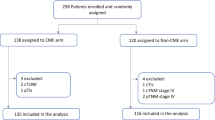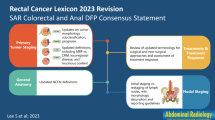Abstract
Background
Lateral pelvic lymph node (LPN) dissection can improve local control in certain rectal cancer patients with LPN metastasis. However, the effects of this technically complex procedure on perioperative safety and long-term survival of elderly patients (≥ 70 years) remain unclear.
Methods
Locally advanced middle–low rectal cancer patients diagnosed with LPN metastasis who underwent total mesorectal excision (TME) with LPN dissection at three institutions from January 2012 to December 2019 were included in this study. Additionally patients who had neoadjuvant chemoradiotherapy (nCRT) and those who did not were compared.
Results
In total there were 407 patients, including 49 elderly and 358 non-elderly patients, of which 249 were male, with a median age of 58 years (range:18–85 years). In the whole cohort, operation time (280.7 vs. 292.0 min, p = 0.498) and estimated blood loss (100 vs. 100 ml, p = 0.384) were comparable in the elderly and non-elderly groups. There was no significant difference in the incidences of overall complications (24.5% vs. 19.8%, p = 0.448) and severe (Clavien–Dindo grade 3–5) surgical complications (8.2% vs. 7.5%, p = 0.778) between the two groups. However, the incidence of urinary retention (14.3% vs. 5.6%, p = 0.032) and intensive care unit admission (16.3% vs. 6.1%, p = 0.018) was significantly higher in the elderly group compared with those in the non-elderly group. The 3-year overall survival (88.7% vs. 82.1%, p = 0.516) and disease-free survival (81.2% vs. 70.7%, p = 0.352) were comparable between the two groups. Moreover, results in the nCRT cohort were comparable to those in the overall cohort.
Conclusions
Even with nCRT, TME combined with LPN dissection is safe and feasible for elderly patients, demonstrating low mortality and acceptable morbidity. Elderly and non-elderly patients with LPN metastasis who undergo LPN dissection can achieve comparable 3-year survival outcomes.
Trail Registration
ClinicalTrials.gov Identifier: NCT04850027.


Similar content being viewed by others
Data availability
Data can be provided upon reasonable request by email directly sent to the corresponding author.
References
Akiyoshi T, Watanabe T, Miyata S et al (2012) Results of a Japanese nationwide multi-institutional study on lateral pelvic lymph node metastasis in low rectal cancer: is it regional or distant disease?: Is it regional or distant disease? Ann Surg 255(6):1129–1134. https://doi.org/10.1097/SLA.0b013e3182565d9d
Sugihara K, Kobayashi H, Kato T et al (2006) Indication and benefit of pelvic sidewall dissection for rectal cancer. Dis Colon Rectum 49(11):1663–1672. https://doi.org/10.1007/s10350-006-0714-z
Yano H, Moran BJ (2008) The incidence of lateral pelvic side-wall nodal involvement in low rectal cancer may be similar in Japan and the West. Br J Surg 95(1):33–49. https://doi.org/10.1002/bjs.6061
Bosset JF, Calais G, Mineur L et al (2014) Fluorouracil-based adjuvant chemotherapy after preoperative chemoradiotherapy in rectal cancer: long-term results of the EORTC 22921 randomised study. Lancet Oncol 15(2):184–190. https://doi.org/10.1016/S1470-2045(13)70599-0
Fujita S, Mizusawa J, Kanemitsu Y et al (2017) Mesorectal excision with or without lateral lymph node dissection for clinical stage II/III lower rectal cancer (JCOG0212): a multicenter, randomized controlled, noninferiority trial. Ann Surg 266(2):201–207. https://doi.org/10.1097/SLA.0000000000002212
Hajibandeh S, Hajibandeh S, Matthews J et al (2020) Meta-analysis of survival and functional outcomes after total mesorectal excision with or without lateral pelvic lymph node dissection in rectal cancer surgery. Surgery 168(3):486–496. https://doi.org/10.1016/j.surg.2020.04.063
Jones HG, Radwan RW, Sams E et al (2020) Incidence and treatment of positive pelvic sidewall lymph nodes in patients with rectal cancer. Colorectal Dis 22(11):1560–1567. https://doi.org/10.1111/codi.15176
Malakorn S, Yang Y, Bednarski BK et al (2019) Who should get lateral pelvic lymph node dissection after neoadjuvant chemoradiation? Dis Colon Rectum 62(10):1158–1166. https://doi.org/10.1097/DCR.0000000000001465
Yang X, Gu C, Hu T et al (2021) Indications and oncological outcomes of selective dissection for clinically suspected lateral lymph node metastasis in patients with rectal cancer based on pretreatment imaging. Tech Coloproctol 25(4):425–437. https://doi.org/10.1007/s10151-020-02386-4
Kawai K, Shiratori H, Hata K et al (2021) Optimal size criteria for lateral lymph node dissection after neoadjuvant chemoradiotherapy for rectal cancer. Dis Colon Rectum 64(3):274–283. https://doi.org/10.1097/DCR.0000000000001866
Heriot AG, Tekkis PP, Smith JJ et al (2006) Prediction of post-operative mortality in elderly patients with colorectal cancer. Dis Colon Rectum 49(6):816–824. https://doi.org/10.1007/s10350-006-0523-4
Etzioni DA, Beart RW Jr, Madoff RD et al (2009) Impact of the aging population on the demand for colorectal procedures. Dis Colon Rectum. 52(4):583–90. https://doi.org/10.1007/DCR.0b013e3181a1d183. (discussion 590-1)
van Eeghen EE, den Boer FC, Loffeld RJ (2015) Thirty days post-operative mortality after surgery for colorectal cancer: a descriptive study. J Gastrointest Oncol 6(6):613–617. https://doi.org/10.3978/j.issn.2078-6891.2015.079
Arnarson Ö, Butt-Tuna S, Syk I (2019) Post-operative complications following colonic resection for cancer are associated with impaired long-term survival. Colorectal Dis 21(7):805–815. https://doi.org/10.1111/codi.14613
Amin MB, Greene FL, Edge SB, et al (2017) The Eighth Edition AJCC cancer staging manual: continuing to build a bridge from a population-based to a more “personalized” approach to cancer staging. CA Cancer J Clin 67(2):93–99
Wang P, Zhou S, Zhou H et al (2019) Evaluating predictive factors for determining the presence of lateral pelvic node metastasis in rectal cancer patients following neoadjuvant chemoradiotherapy. Colorectal Dis 21(7):791–796. https://doi.org/10.1111/codi.14595
Zhou S, Jiang Y, Pei W et al (2021) Neoadjuvant chemoradiotherapy followed by lateral pelvic lymph node dissection for rectal cancer patients: a retrospective study of its safety and indications. J Surg Oncol 124(3):354–360. https://doi.org/10.1002/jso.26509
Hashiguchi Y, Muro K, Saito Y et al (2020) Japanese Society for Cancer of the Colon and Rectum (JSCCR) guidelines 2019 for the treatment of colorectal cancer. Int J Clin Oncol 25(1):1–42. https://doi.org/10.1007/s10147-019-01485-z
Clavien PA, Barkun J, de Oliveira ML et al (2009) The Clavien–Dindo classification of surgical complications: five-year experience. Ann Surg 250(2):187–196
Clavien PA, Barkun J, de Oliveira ML et al (2009) The Clavien–Dindo classification of surgical complications: five-year experience. Ann Surg 250(2):187–196. https://doi.org/10.1097/SLA.0b013e3181b13ca2
Duong TT, An HH, Quoc LV et al (2021) Laparoscopic lateral pelvic lymph node dissection for advanced lower rectal cancer: a preliminary vietnamese study. Med Arch 75(4):297–301. https://doi.org/10.5455/medarh.2021.75.297-301
Zhou S, Tang J, Mei S et al (2022) Risk factors and prognostic significance of postoperative complications following lateral pelvic lymph node dissection for rectal cancer: results of the multicenter lateral node study in China. Jpn J Clin Oncol 52(10):1150–1158. https://doi.org/10.1093/jjco/hyac109
Saito S, Fujita S, Mizusawa J et al (2016) Male sexual dysfunction after rectal cancer surgery: results of a randomized trial comparing mesorectal excision with and without lateral lymph node dissection for patients with lower rectal cancer: Japan Clinical Oncology Group Study JCOG0212. Eur J Surg Oncol 42(12):1851–1858. https://doi.org/10.1016/j.ejso.2016.07.010
Jiang Y, Zhou S, Pei W et al (2022) Does neoadjuvant chemoradiotherapy increase the effect of lateral lymph node dissection on urogenital function? Transl Cancer Res 11(4):784–795. https://doi.org/10.21037/tcr-22-87
Acknowledgements
The authors would like to thank TopEdit (www.topeditsci.com) for its linguistic assistance during the preparation of this manuscript. The authors thank all members and staff of the Chinese Lateral Node Collaborative Group for collecting data.
Funding
This study received funding from the National Key Research and Development Program/Prevent and Control Research for Important Non-Communicable Diseases (No. 2019YFC1315705) and the Medicine and Health Technology Innovation Project of the Chinese Academy of Medical Sciences (No. 2017-12M-1e006).
Author information
Authors and Affiliations
Contributions
All authors made a significant contribution to this study in either some or all of the aspects, including the study conception, design, execution, data acquisition, analysis and interpretation, and manuscript drafting, revising, or reviewing. All authors gave final approval for the version to be published, have agreed on the journal to which the article has been submitted, and agreed to be accountable for all aspects of the work.
Corresponding authors
Ethics declarations
Conflicts of interest
Sicheng Zhou, Shiwen Mei, Bo Feng, Yingchi Yang, Xin Wang, Quan Wang, and Qian Liu have no conflicts of interest or financial ties to disclose.
Ethical approval
The study was performed with approval by the Ethics Committee of the Cancer Hospital, Chinese Academy of Medical Sciences (NCC 2017-YZ-026, Oct 17, 2017).
Informed consent
Prior written informed consent was obtained from all study participants.
Additional information
Publisher's Note
Springer Nature remains neutral with regard to jurisdictional claims in published maps and institutional affiliations.
Rights and permissions
Springer Nature or its licensor (e.g. a society or other partner) holds exclusive rights to this article under a publishing agreement with the author(s) or other rightsholder(s); author self-archiving of the accepted manuscript version of this article is solely governed by the terms of such publishing agreement and applicable law.
About this article
Cite this article
Zhou, S., Mei, S., Feng, B. et al. Feasibility and safety of lateral pelvic lymph node dissection for elderly patients with middle-low rectal cancer: results of a large multicenter lateral node collaborative group study in China. Tech Coloproctol 27, 655–664 (2023). https://doi.org/10.1007/s10151-022-02746-2
Received:
Accepted:
Published:
Issue Date:
DOI: https://doi.org/10.1007/s10151-022-02746-2




